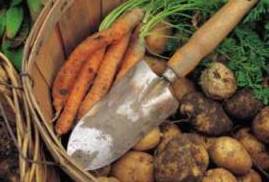|
Organic Gardening Tips and Ways to Go Green Outside
The best place to start doing our part to save the earth is right in our own backyards. Organic gardening is a wonderful way to start feeling reconnected to the earth and to the planet we live on in a very personal way. This section offers some organic gardening tips and things you can do to go green outside. Please also visit our nature conservation section for more in-depth information on conservation issues as well as resources and organizations that you can support.
1. Plant trees in your yard or make a donation to plant forest trees. More trees create more oxygen and less carbon dioxide in the atmosphere. Trees are crucial to a healthy ecosystem. They increase biodiversity, protect and help to preserve water in our soil and add moisture to the atmosphere. They also provide diverse habitat for a multitude of wildlife. Check out www.getonboardnow.org " onclick="return FIX.track(this);">www.getonboardnow.org and find out how you can donate a tree and help The Conservation Fund to reverse climate change. 2. Plant an organic garden in your yard or a container garden on your apartment balcony. Getting involved in organic gardening will not only help to beautify your surroundings, it will also serve to support the environment. If you grow your own organic vegetables and herbs, you can also have the pleasure of eating, enjoying, and sharing what you grow with your neighbors and friends. Not sure how to create an earth-friendly garden? Find more organic vegetable garden tips here. 3. Create organic gardening compost for your garden. Organic waste such as eggshells, banana peels, orange rinds and almost anything discarded from the kitchen (except for meat products), can be “recycled” and will bring new life when reused outside. Composting is good for your garden as it creates richer, more fertile soil. It also helps to reduce hundreds of pounds per year of organic matter from our households which are disposed of in garbage dumps and land fills. 4. Use organic fertilizers and stop using pesticides, which poison the environment with toxic chemicals. Organic gardening is all about using natural alternatives. Please think twice about spraying the trees or lawn with chemical pesticides! There are many safe and natural alternatives to choose from.
*Don’t litter. Even a cigarette butt thrown outside a car window has an impact.
*In the garden, utilize soaker hoses to get water to the roots where it is needed most. *Try using a rain barrel to collect rainwater with which to water your garden.
8. Try using a rotary mower, and non-electric or non-gas-powered hedge trimmers, to save energy.
9. Plant heirloom seeds to restore the abundance of indigenous plants, depending on your geographic location, and to help ensure that they don’t die out.
Click here to return from Organic Gardening Tips to Ways to Go Green
|






